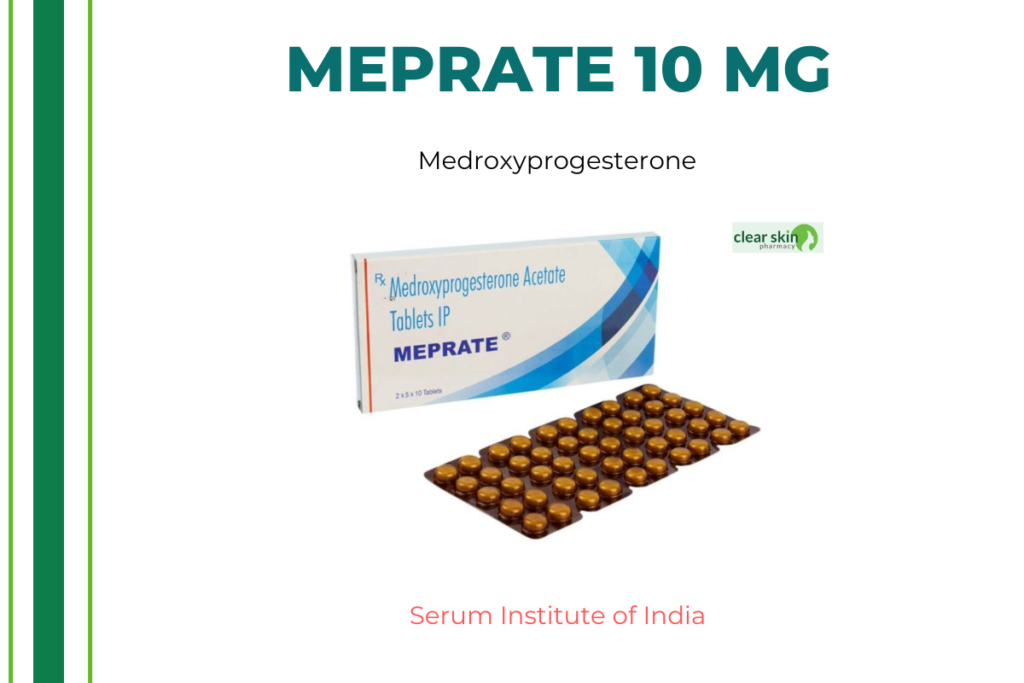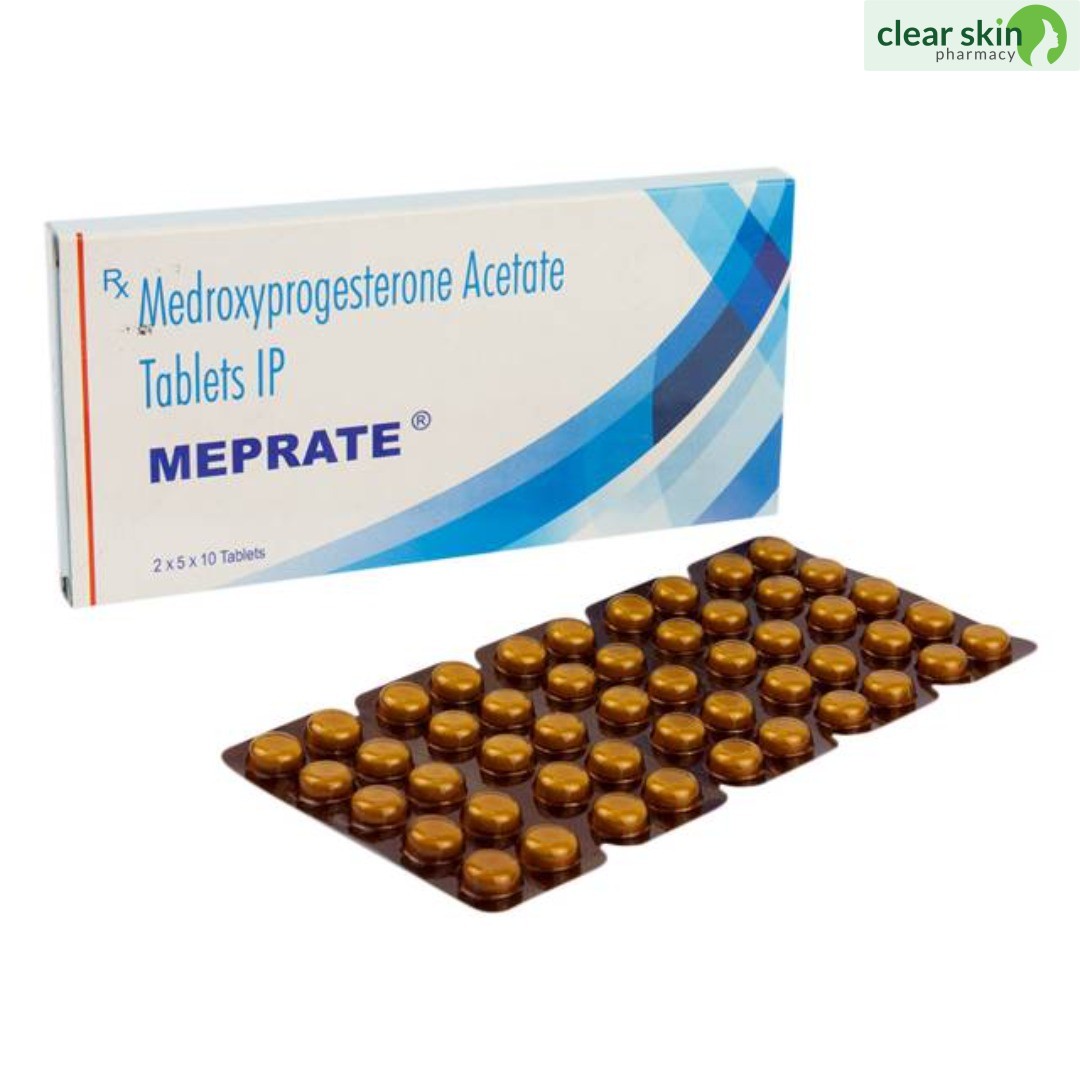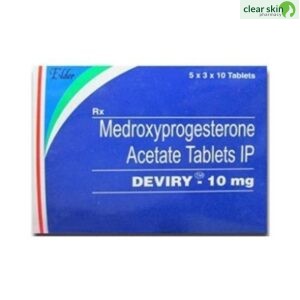Meprate
Meprate is a progestin (a kind of progesterone) and a female hormone that influences ovulation (the release of an egg from an ovary). It is used to treat both amenorrhea and irregular uterine bleeding. It also protects postmenopausal women on estrogen hormone replacement therapy against endometrial hyperplasia (a condition that raises the risk of cancer) and uterine hyperplasia.
Meprate is available in several dosage forms, including oral, vaginal, and muscle injections. Meprate is also available as a pill, ring, and intrauterine (IU) device. Meprate should be taken in the evening or before bedtime, without eating. Possible side effects include breast discomfort, other body swelling, headaches, migraines, mood swings, depression, acne, stomach (abdominal) pain, back pain, and vaginal bleeding. The majority of Meprate’s adverse effects do not necessitate medical treatment and diminish over time. However, if the bad effects persist, see a physician.
Make an attempt to continue taking your medications. Meprate may increase your risk of developing a blood clot. Before using this medication, inform your doctor if you have or have had had breast cancer, abnormal vaginal bleeding, liver disease, or any other health condition. Please inform your doctor if you are allergic to any drugs or if you are on any other medications. To avoid unwanted side effects, refrain from smoking and ingesting alcohol. Meprate should not be used to prevent heart disease or dementia due to its potential to increase the chance of developing these conditions.
Meprate is used to treat, among other conditions, amenorrhea (absence of menstruation), uterine bleeding, and endometrial hyperplasia (thickening of uterus)

Medicinal Advantages
Meprate is a female hormone that assists in ovulation and menstruation management. Meprate assists women who have not yet achieved menopause in initiating the menstrual cycle (periods). In addition, it decreases uterine size in postmenopausal women getting estrogen replacement therapy (HRT). Meprate is used to prevent the thickening of the uterine lining in postmenopausal women taking estrogens who have not had their uterus surgically removed. Additionally, it helps cure amenorrhea (cessation or irregular menses cycle for more than 3 months). As part of the replacement therapy for menopause, it is also used in combination with estrogens. Meprate injection is used to treat abnormal uterine bleeding as well as menstrual periods that are irregular or have ceased. The intravaginal gel formulation of Meprate may aid infertile women with progesterone deficiency, irregular or absent menstrual periods. The vaginal insert version of meprate enhances early pregnancy and embryo implantation. Meprate is utilized off-label to minimize the risk of preterm birth.
Use Instructions
Meprate should only be used if a doctor has recommended it. Always take Meprate exactly as directed by your doctor. Your doctor will recommend how frequently you should take your prescriptions based on your specific medical condition.
Place in a cool, dry area out of direct sunlight.
Meprate Side Effects
Meprate, like many medications, can have adverse effects, but not everyone will experience them. Common side effects include headache, breast discomfort, irregular vaginal bleeding or spotting, stomach/abdominal pain, bloating, nausea and vomiting, hair loss, fluid retention, and vaginal yeast infection. The majority of Meprate’s adverse effects do not necessitate medical treatment and diminish over time. Consult your doctor if the negative effects persist or if you have any unexpected side effects while taking Meprate.
Drug Recommendations
With the combination of medroxyprogesterone and estrogen, heart disease, heart attacks, strokes, and dementia should not be prevented. Combining estrogen with medroxyprogesterone raises the risk of heart attacks, strokes, breast cancer, and blood clots. In certain instances, the combination of medroxyprogesterone and estrogen has been related to dementia in women aged 65 and older. Do not use Medroxyprogesterone if you are allergic to peanuts, have unusual vaginal bleeding, have or have had any type of cancer (breast or uterine cancer), or are taking estrogen with progestin. Consult your doctor before using Medroxyprogesterone if you have had a heart attack, stroke, blood clot, liver problems, kidney problems, are pregnant, breastfeeding, or planning to become pregnant, have asthma (wheezing), epilepsy (seizures), diabetes, migraine, endometriosis, lupus, heart problems, thyroid, or high blood calcium levels. Be cautious when driving since dizziness or drowsiness may occur. Inform your doctor whether you are taking Medroxyprogesterone before undergoing any laboratory testing or biopsies, since it may influence the findings. Diagnostic tests for blood coagulation, thyroid, cholesterol, and glucose metabolism may be changed in individuals using Medroxyprogesterone.
Interactions Between Drugs
This medication may interact with anticonvulsants such as acetazolamide and carbamazepine; anti-infectives (metronidazole, clindamycin); and herbal medicines (such as Ginkgo Biloba and St. John’s wort plant).
Grapefruit, Ginkgo biloba supplements, and St. John’s wort may interact with medroxyprogesterone (used for anti-depression).
In situations of abnormal vaginal bleeding, poor bone mineral density, breast cancer, liver disease, or thromboembolism, medroxyprogesterone should not be used (blood clot problem).
Safety Suggestions
ALCOHOL
Since there is little scientific information regarding the effects of medroxyprogesterone on alcohol, it is advisable to see a physician.
PREGNANCY
Before using Medroxyprogesterone, see a physician. Your doctor will decide whether or not to prescribe Medroxyprogesterone to a pregnant lady based on her particular circumstances.
BREAST FEEDING
Despite clinical data indicating that medroxyprogesterone gets into breast milk, the potential for injury is unknown. Therefore, it is advisable to see a physician before to using Medroxyprogesterone.
DRIVING
After using Medroxyprogesterone, it is advised that you use caution behind the wheel because it may impair your driving skills. It has the potential to induce drowsiness.
LIVER
Use cautious with medroxyprogesterone, especially if you have a history of liver issues. Your physician may need to adjust the dosage.
KIDNEY
Since there is little scientific information regarding the effects of medroxyprogesterone on the kidney, it is advised to see a physician.
No habit formation
Advice on Diet and Lifestyle
Frequent exercise and physical activity can help minimize hot flushes and enhance sleep. Additionally, weight-bearing exercises can help strengthen bones. Aerobics, yoga, and hobbies like tai chi may all assist in body and mind relaxation.
Before going to bed, wear loose clothing and sleep in a cool, well-ventilated place. By doing so, hot flashes and nighttime sweats can be prevented. Sleep for a minimum of eight hours.
Caffeinated drinks, alcoholic beverages, and spicy meals are known to produce hot flushes and should be avoided or consumed in moderation.
To improve your mood swings caused by hormone changes, aim to stay stress-free.
Quit smoking to reduce your chance of chronic illnesses such as heart disease, stroke, and cancer, in addition to hot flushes.
If you are experiencing vaginal dryness, consider using a lubricant or moisturizer.
Recommendations
Consult with your physician frequently about whether you should continue to use Medroxyprogesterone. Adding a Medroxyprogesterone supplement is commonly suggested for women who are at risk for uterine cancer.
Contact your doctor if you suffer vaginal bleeding while taking Medroxyprogesterone.
Unless your doctor directs you differently, you should get an annual pelvic exam, breast exam, and mammogram (breast X-ray). If you or a family member has experienced breast cancer, breast lumps, or an abnormal mammogram. Your physician may recommend more frequent breast examinations.
Inform your physician if you have high blood pressure (hypertension), high cholesterol (hyperlipidemia), diabetes, or obesity before using Medroxyprogesterone (BMI more than 25). Tobacco use may raise your risk of cardiovascular disease. Consult your physician about ways to lower your risk of heart disease.
Other details: This item is non-refundable.
Concerns of Patients
Female infertility is the inability to conceive after one year of trying. Infertility also include pregnancies that result in miscarriages or stillbirths.
Hormone replacement therapy (HRT) is a treatment for menopause that alleviates symptoms. As menopause approaches, lesser levels of hormones are replaced.
PMS refers to the symptoms that women may suffer in the weeks preceding their menstrual period. Each woman’s symptoms are distinct and might vary from month to month. Typical PMS symptoms include mood swings, feelings of sadness, anxiety, or irritability, fatigue or difficulty sleeping, bloating or stomach discomfort, breast tenderness, headaches, spotty skin or greasy hair, alterations in appetite, and changes in sexual desire.
Endometriosis is a painful disorder in which tissue similar to that which typically lines the uterine lining develops within the uterine lining. Common indications and symptoms of endometriosis include painful periods (dysmenorrhea), discomfort during sexual activity, pain during bowel movements or urine, excessive bleeding, and infertility.
FAQs
After ovulation, medroxyprogesterone assists in the endometrial preparation for pregnancy. It thickens the endometrial lining to permit the passage of a fertilized egg. Additionally, it prevents uterine muscle contractions from rejecting an egg in the uterus. If progesterone levels are very high, ovulation will not occur.
Low levels of progesterone result in abnormal uterine bleeding, irregular or absent periods (amenorrhea), abdominal discomfort during pregnancy, and recurrent miscarriages. Low progesterone levels can result in elevated estrogen levels, which can result in reduced libido, weight gain, and gallbladder problems in women.
Medroxyprogesterone can cause weight gain. It might be due to water accumulation. Please consult your physician if you experience rapid weight gain while using Medroxyprogesterone.
Do not use Medroxyprogesterone if you are allergic to peanuts, have unusual vaginal bleeding, have or have had any type of cancer (breast or uterine cancer), or are taking estrogen with progestin. Inform your doctor if you have had a heart attack, stroke, blood clot, liver problems, if you are pregnant, nursing, or intending to become pregnant, or if you are allergic to Medroxyprogesterone.
As a contraceptive, medroxyprogesterone is not utilized. It should not be used as contraception to prevent pregnancy.
Take medroxyprogesterone according to your doctor’s dose and duration instructions.
Medroxyprogesterone is a synthetic pregnane steroid and a progesterone derivative.
Headache, breast discomfort, irregular vaginal bleeding or spotting, stomach/abdominal aches, bloating, nausea and vomiting, hair loss, fluid retention, and vaginal yeast infection are common but less significant side effects of Medroxyprogesterone.







Be the first to review “MEPRATE 10 MG 10 tablets”